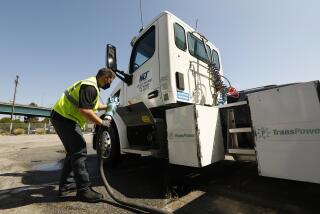Can gas savings make up for a hybrid’s higher sticker price?
Once a rarity in the showroom, fuel-sipping hybrids are becoming an increasingly common option at dealerships.
Need a big luxury sedan with all the bells and whistles that still gets 29 miles to the gallon in everyday driving? Check out the Buick LaCrosse with the eAssist mileage boosting system.
How about a station wagon you can pack with children and groceries and still get 42 mpg? The Prius v fits the bill. Looking for something with high style? Wait for the upcoming edition of the Ford Fusion hybrid that’s expected to hit 47 mpg.
All these new hybrids are a welcome option for consumers who face high gas prices.
But are they worth the premium you might have to pay? It depends. If you decide to keep a hybrid for more than five years, the answer may be yes. But if you’re one of those who like new cars every three years, it may not make financial sense.
Here’s what you need to consider when deciding to go hybrid or not.
Where do you drive?
Hybrids are great for people who drive “mostly in the city and urban places,” said David Champion, who directs the automotive test program at Consumer Reports.
It’s all in the way a hybrid works.
A hybrid routes energy — much of it generated when the vehicle brakes — into a battery. It then uses that electricity to power an electric motor to get the car moving from a stop and to assist in accelerating, passing or hill climbing, all areas in which cars burn up the most gas.
Hybrid systems shine in stop-and-go and slow-speed traffic, said Raj Nair, the global product development chief for Ford Motor Co.
Although adequate, hybrids generally don’t make great highway cars, Champion said. They’re typically slower on the highways and have less cargo space than the gas-only vehicles of similar size.
Here’s an example of just how your particular drive affects the economics of a hybrid vehicle.
Let’s say 75% of your driving is on the highway. At $4 a gallon, it’ll cost the Camry hybrid driver $2.50 to go 25 miles, while the regular Camry driver will pay $3.12, according to the Environmental Protection Agency.
But if you spend most of your time in city traffic over that same distance, the savings are much greater — $2.38 compared with $3.70 for the gas-only car.
The savings could be big enough for you to put up with some driving quality and cargo carrying compromises.
Is there a price premium?
You need to figure out how much money saved at the pump will add up to the cost difference between a hybrid and the same or similar model in a gas-only vehicle.
Let’s go back to our Camry example. On average, the hybrid version sells for $25,850, about $3,300 more than the regular model, according to car price information company TrueCar.com. Factor in the tax and licensing fees on both versions and the difference climbs to close to $3,600, depending on where you live.
Using $4 a gallon, 13,500 miles of annual driving and a ratio of 55% city driving, the hybrid saves about $650 a year. That means it takes about five years to save enough in gas to recoup the extra expense at today’s prices.
Our analysis of hybrid and regular Ford Fusions and Hyundai Sonatas also came up with paybacks in about the same range.
Those who drive 75% or more of their miles at highway speeds aren’t likely to make the difference back during the life of the car. The payback comes at about the 10-year mark.
However, for some cars — mostly the more expensive brands that don’t charge a premium for the hybrid models — the savings are immediate and significant.
Buick sells hybrid and gas-only versions of the LaCrosse with the same sticker price of $31,115 for similar trim and features, according to the EPA. When you plug in our fuel cost and mileage numbers, the hybrid version saves $725 a year on fuel when driven 55% of the time in city traffic.
The hybrid and gas-only version of the Lincoln MKZ also have the same sticker price — $35,630 — but the hybrid model saves the driver almost $1,200 a year based on our analysis.
You can compare vehicles and your own calculations based on your driving patterns at this handy EPA website: FuelEconomy.gov.
Should I worry about the new technology?
Consider this: 95% of all the Toyota Prius hybrids sold since 2000 are still on the road today. That’s a lot of years of fuel savings for their owners.
What about driving?
There’s a consensus among car critics and test drivers that hybrids generally are not as much fun to drive as similar cars with conventional powertrains.
Champion of Consumer Reports compared the Toyota Prius — the bestselling hybrid ever and one of the top-selling passenger cars this year — to the regular Camry. Both are considered “family sedans” in the EPA ratings.
The Prius is considerably slower than the gas-only Camry — by more than two seconds on a zero to 60 mph test. It takes longer to stop, and it has less interior space.
“The Prius is noisier, the ride quality isn’t as good and it is not as comfortable and easy to drive on the highway,” Champion said. “The Camry sits better on the road.”
Another interesting matchup is between the Prius v station wagon and the turbo diesel version of the Volkswagen Jetta SportWagen, which auto information company Edmunds.com says is the internal combustion engine model most compared with the hybrid.
“These two are natural competitors by body style, but with Prius being the new-age hybrid and the SportWagen delivering high mpg with clean diesel,” said Ivan Drury, an analyst at Edmunds.com.
Both models are priced about the same, and they have almost identical rear cargo space and braking distance. The Prius has a bigger passenger cabin and better city fuel economy but is a tad behind the VW on fuel economy in highway driving. The VW is more nimble and faster. Auto reviewers who have driven both vehicles almost universally give the driving edge to the Jetta.
“The driving experience is going to be the deciding factor,” Drury said. “The Prius will certainly be a point A to point B vehicle, while the SportWagen does give the buyer the option of having a manual transmission to increase the level of driver involvement.”
Should I consider time of ownership and resale value?
Absolutely. For any hybrid, the savings add up the longer you keep your car and as gas prices rise. Hybrids, especially the Prius models, also tend to have higher resale values than gas-only cars. If you plan to sell your hybrid after five years, the total cost of ownership can be even more favorable.
Here’s an example: If you had a Prius v and a VW diesel wagon and sold them after five years, the cost of owning the Prius v would be about $3,600 less, with half of that savings coming from the higher anticipated resale value of the Toyota, according to auto lease data firm ALG Inc.
What’s the future for hybrids?
Expect more offerings and constant improvements of new models. This year, there are 36 different hybrids on the market, according to Edmunds.com. That’s expected to grow to more than 40 in 2013. The figures don’t include plug-in hybrids, which are more expensive and are typically grouped with electric vehicles.
Hybrids make up a little more than 3% of new car sales, but automakers will need to sell more to meet increasingly stringent fuel economy regulations, said Karl Brauer, editor of Total Car Score, an automotive research and comparison website.
Brauer likens hybrid technology to the advent of fuel injection, which is now ubiquitous.
Once only a feature of luxury and sports cars, “you would not build a modern car without fuel injection because of fuel efficiency and emissions,” he said. “At some point all of us will be buying hybrids because the technology will be cheap enough to be included in the price of every car.”






